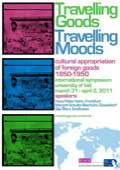
|
07 Frederike Felcht Networks of Texts and Things On Hans Christian Andersen’s Travelogue in Spain (1863)
It was his publisher’s good offer for the second edition of his illustrated fairy tales that allowed Hans Christian Andersen to travel to Spain in 1862. This economic background information can be found in the final version of Andersen's autobiography that was first published in the USA. Thus, Andersen's texts demonstrate how movements and relations are generated by the interaction of human beings and things. My contribution traces this interplay in several directions.   First, it reconstructs the history of Andersen's travelogue In Spain and follows the integration of Andersen's texts in an expanding network of translations. Andersen is one of the most translated authors of the world, and his publishing strategy was transnational from the early years of his career. The history of his texts allows insights into the structure of the world literary space (Casanova 2004) and it shows possibilities to secure intellectual property in translation processes before the existence of an effective international copyright law. But Andersen's texts do not only become commodities, they do also reflect on processes of commodification. How does the travelogue itself deal with the spread of a global commodity culture? In Spain characterizes Spain and Africa as hybrid spaces, and this hybridity is mainly created by things. The integration into global commodity chains leads to a superposition of center and periphery (Wallerstein 2004), modernity and tradition. Thus, the text acknowledges the specific role of things in processes of hybridization of time and space (Latour 1995). Furthermore, In Spain demonstrates how modern global culture generates fetishistic relations between human beings and things and, in doing so, questions Eurocentric concepts of identity. The contribution shows, how the agency of texts and things undermines the idea of the autonomous subject.
Video Length: 0
Date Found: July 16, 2011
Date Produced: July 11, 2011
View Count: 0
|